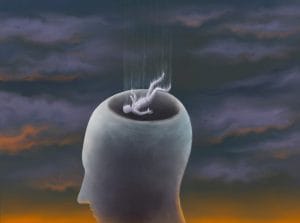Our bodies and minds don’t always do what we tell them to. You could be on a date, and all you’re trying to do is stay calm and not come across a certain way, but there’s no guarantee that your mind and body are going to comply with this request. It can sometimes feel like your mind is actively working against you and your well-being. That’s certainly the case with anxiety and intrusive thoughts.
 Most people can probably pinpoint a time when they felt anxious, or when a thought entered their mind unbidden. Such experiences can range from being mildly uncomfortable to being downright distressing. The good news is that they can be dealt with effectively, helping to restore calm and peace in your life.
Most people can probably pinpoint a time when they felt anxious, or when a thought entered their mind unbidden. Such experiences can range from being mildly uncomfortable to being downright distressing. The good news is that they can be dealt with effectively, helping to restore calm and peace in your life.
Anxiety and Intrusive Thoughts
Anxiety is the feeling of nervousness, fear, or worry that you experience when you’re in a situation that feels unsettling, frightening, or threatening. When you feel anxious, it’s often accompanied by racing thoughts, feeling restless and irritable, and you may even have a rapid heartbeat and be unable to sleep. Anxiety may last for a few moments after you’ve been in a frightening situation, but it can also linger, pointing to an ongoing condition.
Intrusive thoughts are distressing and unwanted images, thoughts, urges, or ideas that enter a person’s mind. These thoughts can be unwanted for a variety of reasons, including the fact that the thoughts go against one’s personal values. These two can feed off each other and worsen things.
Some of the connections between them include the following:
Intrusive thoughts fuel anxiety Having unwanted thoughts piling into your mind can be quite distressing, and because these thoughts come and go as they please, and because some of them can be shocking, it can make you more anxious. This creates a cycle in which anxiety and intrusive thoughts make each other worse.
Anxiety triggers intrusive thoughts If you’re feeling anxious, your mind is more prone to racing, worrying, being afraid, and making huge leaps of logic. In such a state, it’s easier for intrusive thoughts to emerge and thrust themselves on your mind. If you’re feeling anxious about an exam, that can open you up to intrusive thoughts about failure, social rejection, and other negative outcomes, for example.
Underlying factors. A person’s proclivity to both conditions can flow from the same or shared underlying reasons. These include past traumatic experiences, personality traits, as well as having a genetic predisposition to it.
When a person experiences anxiety and intrusive thoughts, it can cast a significant challenge on their shoulders. It can impact mental health, and in turn that affects one’s overall well-being.
Intrusive Thoughts, and How They Affect You
Intrusive thoughts have a strong link with anxiety and are a common symptom of a few anxiety disorders including obsessive-compulsive disorder (OCD), generalized anxiety disorder, and post-traumatic stress disorder (PTSD). Many of us have an intrusive thought every so often; the kinds linked with anxiety are often more intense and frequent.
 What kind of thoughts are often attached to anxiety? These kinds include recurring thoughts about specific situations or outcomes, being afraid of losing control or making a mistake, being afraid of harming yourself or other people, and images or impulses that are disturbing or violent. These aren’t pleasant thoughts to have, and it’s not surprising that they can cause deep distress.
What kind of thoughts are often attached to anxiety? These kinds include recurring thoughts about specific situations or outcomes, being afraid of losing control or making a mistake, being afraid of harming yourself or other people, and images or impulses that are disturbing or violent. These aren’t pleasant thoughts to have, and it’s not surprising that they can cause deep distress.
When you have these kinds of intrusive thoughts, they can trigger anxiety in various ways. They cause distress by their very nature; they are unpleasant, disturbing, and sometimes terrifying. Such thoughts can also lead to rumination, as you try to either suppress or make sense of them. They can also create uncertainty and activate your body’s fear response; this releases stress hormones like cortisol and adrenaline, which can worsen anxiety.
Experiencing intrusive thoughts can be disturbing, and if they occur frequently enough or are distressing enough, they can begin to impact aspects of daily life like work, relationships, or taking care of yourself. These intrusive thoughts, which can in turn trigger or worsen anxiety, can affect your day-to-day existence in several ways.
Emotional distress Having anxious and intrusive thoughts can be uncomfortable and distressing. On account of these, you may also experience mood swings, be more irritable, and be emotionally reactive.
Behavioral changes When anxiety and intrusive thoughts are triggered by particular places, people, or situations, most people’s natural instinct is to avoid these triggers. You may also find yourself engaged in compulsive behaviors like cleaning or checking. These often function as a coping mechanism. Lastly, intrusive thoughts and anxiety may also result in social isolation and withdrawal from others.
Physical impact Being assailed with anxiety and intrusive thoughts can lead to disrupted sleep. When you don’t sleep well, it has all kinds of side effects, including fatigue which is compounded due to the emotional and mental demands of managing the intrusive thoughts. You may also experience physical tension, headaches, and digestive issues as a result.
 Cognitive effects Fatigue can affect your ability to concentrate and remember things. This in turn makes it harder to take on new information as well as finish tasks. Intrusive thoughts can take up a lot of head space, making it harder to pay attention to what’s around you, including your relationships or work. Intrusive thoughts can also trigger rumination, which worsens anxiety.
Cognitive effects Fatigue can affect your ability to concentrate and remember things. This in turn makes it harder to take on new information as well as finish tasks. Intrusive thoughts can take up a lot of head space, making it harder to pay attention to what’s around you, including your relationships or work. Intrusive thoughts can also trigger rumination, which worsens anxiety.
Relational impact Anxiety and intrusive thoughts can also affect your relationships, as loved ones may not understand what you’re experiencing, and they can make intimacy with others challenging. These various experiences can make social interactions difficult, leading to withdrawal from social situations and relationships, too.
If you experience intrusive thoughts and anxiety, that can cause a decline in your productivity at work and affect how you manage your responsibilities. It may feel easier to avoid certain activities or spaces, particularly if they’re associated with triggers. This in turn can make it harder to meet obligations you may have in your life.
Getting Help
Anxiety and intrusive thoughts can reinforce one another, making your life harder in several ways. The good news is that while breaking the cycle of anxiety and intrusive thoughts can be challenging, several strategies are quite effective and may help. If you’re experiencing anxiety or intrusive thoughts that overwhelm you, and if they are distressing you and undermining what you want to accomplish, you should seek professional help.
Some of the strategies that can be implemented to handle intrusive thoughts and anxiety include self-help strategies like keeping a thought journal. By noting your intrusive thoughts, you can identify some of the patterns behind these thoughts, as well as their triggers. You can also take care of yourself by remembering that your intrusive thoughts don’t define you; treat yourself with kindness, patience, and understanding.
Other self-help strategies you can use include regularly exercising, because that physical activity helps you to relieve tension, and it can also elevate your mood. While it may feel natural to want to withdraw from loved ones, it’s precisely at this point that you should draw near to them. Connect with your social support network and confide in trusted people in your circle.
 Taking care of yourself may also include taking on habits like aiming to get good sleep every night, as that can help you regulate anxiety and other emotions better. You can also help yourself by limiting how much social media and news you take in; it helps to limit the amount of stress-inducing content you consume.
Taking care of yourself may also include taking on habits like aiming to get good sleep every night, as that can help you regulate anxiety and other emotions better. You can also help yourself by limiting how much social media and news you take in; it helps to limit the amount of stress-inducing content you consume.
Lastly, you can seek help from a mental health professional. There are various therapies that can help, like Cognitive Behavioral Therapy (CBT), which is a therapy that helps you to identify and challenge distorted or unhelpful thinking patterns. Your therapist can also help you by teaching you relaxation techniques like deep breathing, progressive muscle relaxation, or visualization, which can help to reduce anxiety, and the symptoms associated with it.
Other interventions include developing mindfulness, which can help you become more aware of your own thoughts and feelings, making it easier to manage intrusive thoughts. Another therapy, called Acceptance and Commitment Therapy (ACT), focuses on helping you to accept difficult emotions and thoughts while being intentional and taking active steps toward accomplishing your life goals.
If you experience anxiety and intrusive thoughts, reach out to begin meeting with me or another faith-based counselor in Texas who can help.
“Overwhelmed”, Courtesy of Nik Shuliahin, Unsplash.com, CC0 License; “Watching the Fog”, Courtesy of Mitchell Hartley, Unsplash.com, CC0 License; “Depression”, Courtesy of Getty Images, Unsplash.com, Unsplash+ License; “How Are You Really?”, Courtesy of Finn, Unsplash.com, CC0 License
-
Mccartney Paul: Author
As your counselor, I will meet you wherever you are and walk alongside you toward growth and positive change. I offer professional Christian counseling for children, teens, couples, adult individuals, families, and groups. My practice benefits from t...
DISCLAIMER: THIS ARTICLE DOES NOT PROVIDE MEDICAL ADVICE
Articles are intended for informational purposes only and do not constitute medical advice; the content is not intended to be a substitute for professional medical advice, diagnosis, or treatment. All opinions expressed by authors and quoted sources are their own and do not necessarily reflect the opinions of the editors, publishers or editorial boards of Stone Oak Christian Counseling. This website does not recommend or endorse any specific tests, physicians, products, procedures, opinions, or other information that may be mentioned on the Site. Reliance on any information provided by this website is solely at your own risk.






